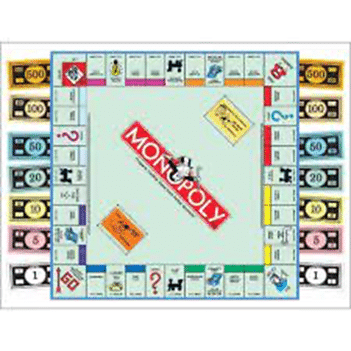
Today’s author is Prince of Peace member, Carol Swanson.
How many of you spent hours playing Monopoly when you were a kid—or maybe still do? Did you love it? Amassing wealth, property, houses and hotels! Or did you hate it? Too often the loser. I admit I’m in the latter category. And yet I always wished I could be good at it. Or maybe play the banker while my brothers and cousins played.
On a Saturday afternoon not long ago, I happened to turn on PBS’s American Experience and watched their episode on the history behind the game Monopoly. Fascinating. Here is the blurb on the PBS website:
“For generations, Monopoly has been America’s favorite board game, a love letter to unbridled capitalism and — for better or worse — the impulses that make our free-market society tick. But behind the myth of the game’s creation is an untold tale of theft, obsession and corporate double-dealing. Contrary to the folksy legend spread by Parker Brothers, Monopoly’s secret history is a surprising saga that features a radical feminist, a community of Quakers in Atlantic City, America’s greatest game company, and an unemployed Depression-era engineer. And the real story behind the creation of the game might never have come to light if it weren’t for the determination of an economics professor and impassioned anti-monopolist.
“Part detective story, part sharp social commentary and part pop-culture celebration, Ruthless: Monopoly’s Secret History presents the fascinating true story behind America’s favorite game.”
Let me share a teaser about each of these key players in history (pun intended):
When the OPEC oil cartels caused the gas crisis in the 1970s, Ralph Anspach, economics professor in San Francisco, created a game he called Anti-Monopoly. When it became popular locally, Parker Brothers came after him. He fought back. A David vs Goliath story that reached the Supreme Court. He also uncovered the suppressed history behind the game.
A radical feminist, Lizzie Magie was concerned with the growing gap between rich and poor and the rise of millionaires and land monopolies. She wanted to get people thinking and developed a game. She received a patent for “The Landlord Game” in 1904 and renewed in 1924. Interestingly, she included two sets of rules. One set was very much like our modern Monopoly game played until one wins it all and the others lose it all. For the second version, rents aren’t paid to the landlord but into the public treasury for the good of the community.
The Quakers in Atlantic City were the ones who developed the board with the “properties” we are familiar with. It was based on their city’s neighborhoods segregated by race, ethnicity, and class.
The unemployed Depression-era engineer was Charles Darrow. With a family and a special-needs child, he was desperate for money. Introduced to the game by a Quaker couple, he stole it, then claimed to have invented Monopoly and got a patent in 1935.
Parker Brothers bought the rights to the game and then needed to ruthlessly fight for total control of any competition.
The game with its history isn’t a parable, but I think it has multiple lessons on the complexity of economics, social justice, and politics.
Jesus was also very interested in these. In her final chapter Levine writes, “The parable should disturb. If we hear it and are not disturbed, there is something seriously amiss with our moral compass. It would be better if we perhaps started by seeing the parable not as about heaven or hell or final judgment, but about kings, politics, violence, and the absence of justice. If we do, we might be getting closer to Jesus.” (Short Stories by Jesus, 304)
On Monday night many of us from Prince of Peace attended the Roseville city council meeting to support the appeal allowing us to have the tiny homes as they are now on our church property—a problem with code violation, the city says. Pastor Peter, Valerie Roy, and Michael Stetzler spoke eloquently, as well as a friend of Valerie’s and two of our neighbors living very close to us who wanted to offer their support. There were comments by the council, comments by the lawyers on both sides. And the appeal was not accepted. Not a surprise, I am told, but this is not the end. The city and Prince and Peace do hope to work together. And as a church, federal law is on our side.
We returned to the potluck at Prince of Peace to join our guests: people from Mosaic Community Church and Sacred Settlement. Despite the lack of good news, there was great fellowship and a feeling of celebration in our togetherness, working to further the reality of God’s kingdom on earth in such a focused and creative way.
We pray— God of relationships and caring community. You have blessed us with these developing relationships—with Valerie, the Beary family, Settled, the police, city council of Roseville, and supportive neighbors. Continue to guide us on our journey. May we “do justice, love kindness, and walk humbly” with you and with one another. Amen.
CLICK HERE to watch the full PBS show. It is well worth watching. (52 minutes!)